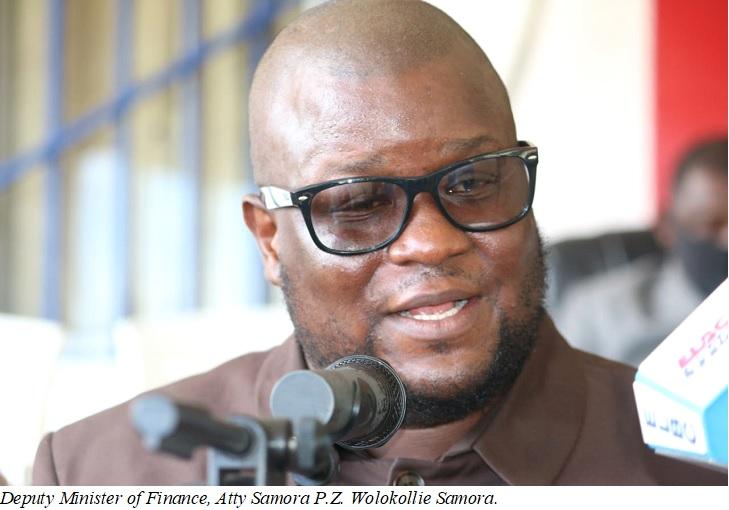
Africa-Press – Liberia. Many commentators believe that upon the takeover of state power in 2018, the Coalition for Democratic Change Government bumped into a thick fog of macroeconomic paralysis that nearly crushed the young administration into tatters. Though the preceding administration successfully worked for and obtained external debt relief for the nation and benefited from a surge of massive external supports, it left the national coffer starving and paltry, occasioned by a crushing inflation that took a jet-speed pace by early 2018. For two and half years, the post-conflict nation of Liberia was left to grope about its own way out of the quagmire while the reigning political regime pieced together strategies and actions to find an anchor point. It was not until the third year of its existence, that the CDC government began to find its bearing and the fruits of its fiscal and monetary engineering began to show out. At yesterday’s MICAT Press Briefing, the Deputy Minister of Finance for Fiscal Affairs unveiled the secrets and magic wand that are restoring solid hope and stability of the Ship of the Liberian Economy. The Analyst reports.
The health of the Liberian economy is markedly improving, not only in terms of statistics but also practical signs and impact in the public space; courtesy of Deputy Minister of Finance, Atty Samora P.Z. Wolokollie.
Mounting the podium at a National Press Function, the regularly weekly press briefing organized by the Ministry of Information, Cultural Affairs and Tourism (MICAT), on August 26, 2021, the Deputy Finance Minister laid bare strategies and actions that were taken by Government to surmount and triumph over the rather messy economic situation inherited by the George Weah-led administration.
Tracing the Magic Wand
He spoke at length about recent transformative developments that have been achieved at the Ministry of Finance and Development Planning, which according to him include but are not limited to regularization of the payroll process, prudent cash management, tax policy reform and financial reporting.
The combination of these product fiscal actions and policies have resulted into the stabilization of the Liberian money market which was in free fall and an appreciable increase in domestic revenue.
According the Deputy Finance Minister, the Weah administration has successfully cleared the backlog of unpaid salaries, regularized salary payment, and taken proactive steps to clean the payroll of any defects.
In this role, he said, the collaborative efforts of the Civil Service Agency cannot be overemphasized, commending its Director General for his leadership in collaborating with the MFDP and the Internal Audit Agency (IAA).
In addition to the launch of the new Fiscal Data Transparency Measure, Atty Wolokollie said, the Ministry of Finance has begun implementing a newly designed Cash Management System that has effectively addressed the age-old issue of the unavailability of cash when allotment is being made.
Under the new system, allotments are now being approved based on the availability of cash.
He noted that in order to buttress fiscal transparency, a weekly fiscal report is published on the Ministry of Finance and Development Planning website which detail inflow and outflow of GoL budget execution.
This report entails Appropriation, Allotments, Financial budget and cash Expenditures by economic classification for Ministries and Agencies.
Minister Wolokollie also reported that besides to strengthening fiscal transparency, the Ministry of Finance and Development Planning (MFDP) has embarked on a First in First Out (FIFO) approval process at the cash management and Financial Approval unit.
By this, Ministers and Agencies of Government will receive an alert or a call whenever payments are approved in financial budget. Moreover, the ministry has also embarked on a working relationship with the Internal Audit Agency (IAA) to improve on the Public Financial Management (PFM) reinforcement and also fast track the payment process flow. With this relation, a clearing house comprising staff from the IAA and MFDP will clear every payment vouchers in order to enhance the process flow.
Reaping the Benefits
According to the Deputy Fiscal Affairs Minister, the expansionary policies have ultimately led to increased economic activities and subsequently to more domestic tax generation.
He said the administration’s focus on domestic resource mobilization would also ensure that our tax regimes are not overly restrictive and prohibitive. Our objective is to foster those policies that would facilitate trade and other economic activities.
Thus, for the period under review, that is, fiscal year 2020/2021, ending June 30, 2021, the Weah administration has recorded a significant milestone in domestic revenue generation.
He said: “At June 30, 2021, domestic revenue peaked to a record $560 Million United States Dollars – the highest ever recorded! This magnificent performance in domestic revenue generation can be credited to various tax policy (Excise Tax Reform, Investment Incentives Reforms, Surcharge Reforms, etc.) and tax administration efforts (Online tax payment, robust tax enforcement mechanisms, etc.) by the Ministry of Finance and Development Planning and the Liberia Revenue Authority.”
For now, and into the foreseeable future, Atty Wolokollie assured Liberians that Government will continue to take deliberate steps aimed at increasing domestic revenue so that the lives of our people are improved and infrastructure development is achieved.
He reports: “The total draft budget for FY 2020/2021 covering the period July 1, 2020 – June 30, 2021, as enacted by the National Legislature and signed into law by the President was $570.1m disaggregated: Domestic Revenue – $ 428.1m; external resources, $132.0m and brought forward, $10m.
He further said during the course of the execution of the budget, actual revenue over performed the projected revenue envelope.
“This over performance resulted in the recast of the previously submitted budget. This recast, unlike many other recast in the past, was to account for the over performance of revenue, not its underperformance. As stated earlier, the budget for the last fiscal year, FY 2020/2021 recorded a significant over performance due to prudent fiscal leadership.
The recast resulted into the revised budget of: Domestic Revenue – $466.8m; external Resources – $133.5m; brought forward – $23.8m, netting the total of resource envelope of $624.1 m.
Exceeded Projection of $71.6m
The visibly happy Deputy Finance Minister declared: “Ladies and Gentlemen of the Press, it is my pleasure and honor to inform you that in spite of the recast to increase the resource envelope for the budget year under review, the year-end revenue again exceeded projection. At year end (June 30, 2021), and pending final reconciliation, total revenue collected for FY 2020/2021 amounted to $695.7 Million Dollars – resulting in a whopping $71.6 Million Dollars over performance of revenue. In simple and direct terms: Revenue exceeded approved expenditures by $71.6 Million Dollars – Revenue over performed and this over performance was mainly on account of Domestic Revenue.”
Public Debts
Mr. Wolokollie also reported that Liberia’s total debt stock as at end February 2020 stands at US$1.47 billion of which domestic debts account for US$604.4 million (41 percent) while the external debt stock account for US$861.8 million (59 percent).
Of the domestic debts, debt owed to the CBL amounts to US$487.5 million (80.7 percent); commercial banks, US$65.2 million (10.8 percent); other institutions, US$51.5 million (8.5 percent); and claims, US$0.2 million. On the other hand, of the total external debt, multilateral institutions account for US$748.3 million (86.8 percent) while bilateral sources account US$113.5 million (13.2 percent).
Rising debt levels coupled with falling growth rates have resulted into the country being classified into the category of moderate rate of debt distress and as such, it inhibits our ability to borrow to finance infrastructure projects needed to narrow our infrastructure gap and to also fund a meaningful stimulus package for the country.
Hence, to curb the increase in the public debt, the government is committed to attracting donor grants and low cost financing to support the fight against the virus and to stimulate the economy.
Total debt service as at end February 2020 amounted to US$21.4 million of which principal repayment amounted to US$7.6 million (35.5 percent), interest payment amounted to US$12.8 million (59.8 percent), while subscription amounted to US$1.0 million (4.7 percent). Of the principal repayment, domestic debt accounted for US$2.2 million (28.9 percent) with payments made entirely to debts owed to other institutions while external debt accounted for US$5.4 million (71.1 percent) of which multilateral sources account for US$4.1 million (75.9 percent) while bilateral sources account for US$1.3 million (24.1 percent). With regards to interest payment, interest paid on domestic debt amounted to about US$8.0 million of which US$5.9 million was paid to commercial banks while US$0.2 million was paid to other institutions. This made interest paid on external debt amounted to US$4.8 million with interest paid on multilateral debt amounting to US$3.8 million while bilateral debt amounted to US$1.0 million.
A major challenge to the country at this crucial time is that those debts previously contracted on concessional terms are coming due now. Thus, with falling growth rate and revenue, rising expenditures and widening current account and fiscal deficits, the country risks defaulting on its debt service obligations.
Seeking Another External Debt Reprive
According to the Deputy Finance Minister, the Government is seeking debt waiver on its external debts and a restructuring of its domestic debts.
According to him, the IMF under the Catastrophe Containment and Relief Trust (CCRT) has approved debt service relief for the country.
This provides grant to cover IMF debt obligation for an initial phase over the next six months. This frees up scares financial resources to be channeled towards the health sector to combat the viral outbreak and also towards domestic debt services to stimulate the domestic economy.





